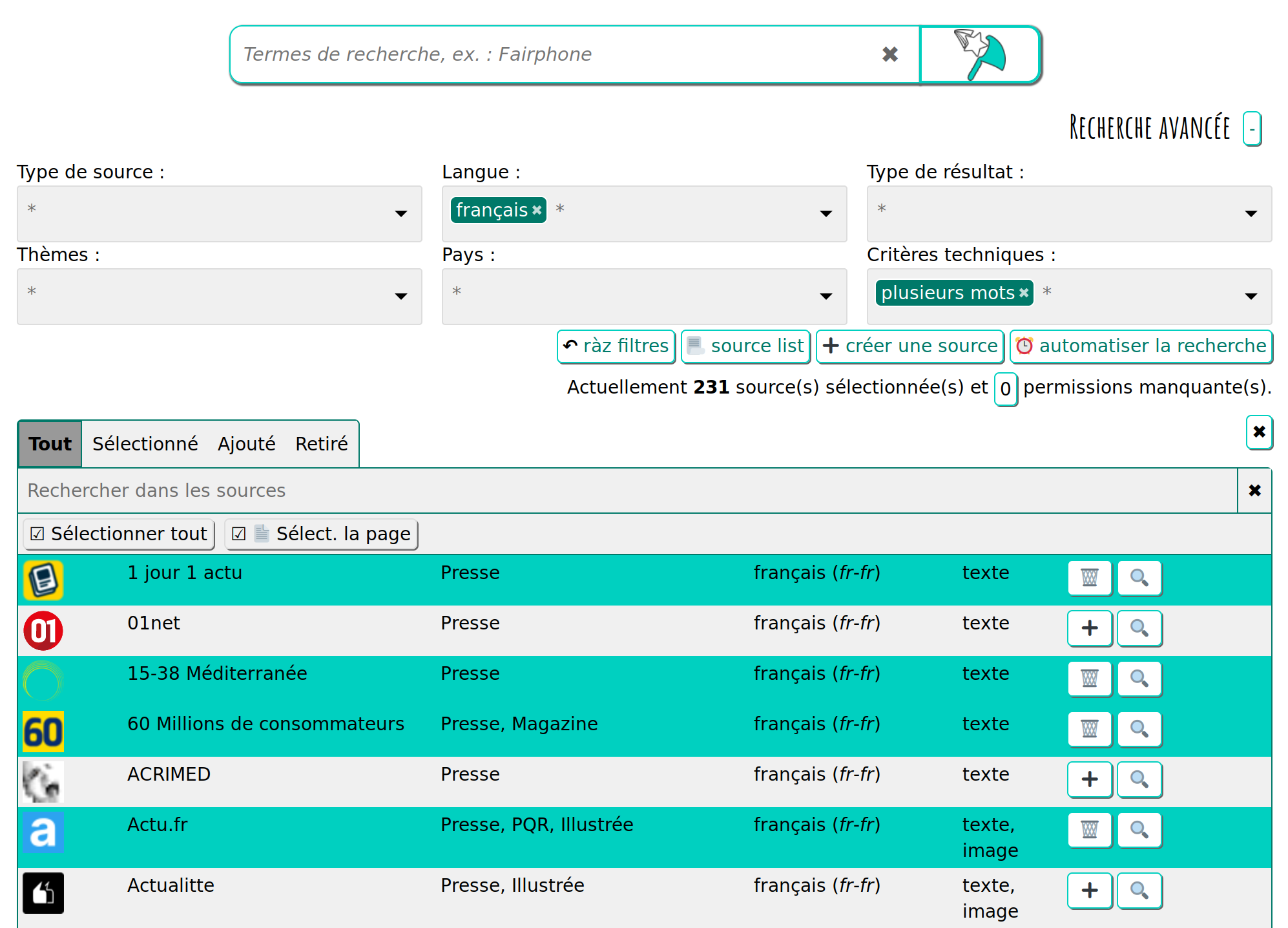A lot of work was needed to add a simple ⏰ schedule search button in the main interface. It required quite some design work to keep things simple in appearance, a shipment of WebExtension specific code (quite different from usual web code) and it required dealing with time zones…
Here is an extract from the newly written documentation about it :
Once you typed your search terms and selected the sources you wanna search in, it’s possible to save the search for later instead of launching it immediately. It’s the role of the ⏰ Schedule search button under the source selection. This button opens a new tab on the "Settings" scrolled to the Scheduled searches part.

This table shows a scheduled search by line. When created, a scheduled search is in "Stop" state, but you just have to select the date, time and periodicity you want for this search to have it activated.
So you can schedule a daily search in a few clicks.
Actions are possible on scheduled searches:
-
the ✏️ "pen" button allows to edit the search, it opens the main search interface with the scheduled search settings (search terms, source selection). Once modified, your search settings can be saved clicking on the "Schedule search" button of the main interface ;
-
the 2nd button, with a copy/paste icon, allows to clone a scheduled search to get another one, that you can configure with the previously described button ;
-
the 3rd button, with a cross on it allows to delete a scheduled search ;
-
the 4th and last button allows to manually start the search from the table.
You can also schedule many different searches, or use the feature just to bookmark your favorite searches. But in this last case, you might prefer to check the documentation on 🔗 permalinks and bookmarks :
When a search is finished a statistics line appears on top of the listed results. This line is fitted with a 🔗 "chain link" icon at the end. This icon allows you to launch the same search again.

So it’s possible to create bookmarks for your favorite searches (sparing configuration time).
To get back to the scheduled searches, an interesting feature is that they come with own notifications, which only pops up if news results where found since the last occurrence of the search. This feature is a big step toward the claimed "Automatized press reviews".
About documentation, the source "cherry-picking" feature has also been added to the documentation page :
It is possible to select the sources you wanna query, one by one.
To do so, you first need to deploy the advanced search panel, clicking on the [ + ] sign in "Advanced search [+]" title. This will display 2 lines of source filtering criterion, and a line of buttons :
-
reset filters
-
list source
-
add source
-
scheduled search
A click on the "list source" button displays a 2nd panel showing the list of all the sources. Different tabs allow you add a specific source to the next search, or remove some others.
The "magnifier" icon, on each source line, set the next search to be performed in this specific source only.

This was very easy to implement, but still it represents a huge difference between Google News and Meta-Press.es. With this feature in particular, and the whole tag-based source filtering mechanism, Meta-Press.es is giving control back to the users instead of popping up results out of the blue. With Meta-Press.es, you know in which sources you searched in, with Google News you have to believe that the selection made was the good one.
And it’s still this tag-based source filtering mechanism which allows to add more and more source types. After the newspapers, the scientific press, the photos and videos, here comes the new Agenda source type, illustrated by nothing less than 28 instances of the militants online agendas Demosphere.net, from 4 different countries. Waiting for Peertube v3 to add a global search feature across all its instances, Meta-Press.es allows you today to search in all the instances of Demosphere (or in the 286 registered sources).
Imagination is the main limitation of the source types that can be added to Meta-Press.es, every date-driven contents can be queried. Don’t hesitate to suggest new source types opening "issues" in the code repository.
To finish, you might have to set back some of your parameters in the settings
as the persist() storage mechanism changed its behavior during the new year
celebrations, obliging us to switch to another browser storage API. Your
custom defined sources should remain safe (but what, you have some sources
that you didn’t sent to us ;-).

 Installation via Mozilla
Installation via Mozilla
 Sources via Framagit
Sources via Framagit
 Sponsor via Liberapay
Sponsor via Liberapay
 Sponsor via HelloAsso
Sponsor via HelloAsso
 Social via Mastodon
Social via Mastodon
 Région Nouvelle Aquitaine
Région Nouvelle Aquitaine